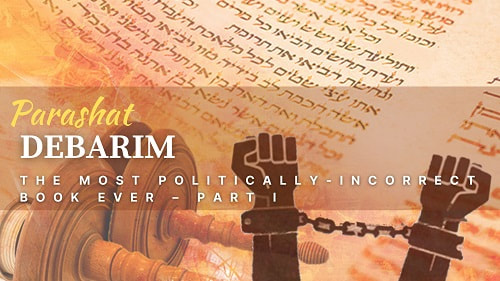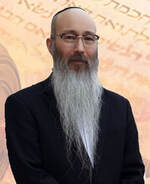|
By: HaRav Menashe Sasson Reporting from Jerusalem, Israel Published in the U.S.A. The “Torah,” which, broadly defined, consists of the Written Law and the Oral Law, is the most politically-incorrect “book” (Hebrew: “sefer” [ספר]; plural “sefarim” [ספרים]) that exists, or which has ever existed. Written Torah is composed of the Five Books of Moshe: Sefarim Bereshit [בראשית], Shemot [שמות], Vayyiqra [ויקרא], Bamidbar [במדבר], and Debarim [דברים]. The names of these sefarim are often mistranslated as “Genesis,” “Exodus,” Leviticus,” “Numbers,” and “Deuteronomy,” respectively. Of the Five Books of Moshe, all of which are politically-incorrect to some extent or another, Sefer Debarim [דברים] is the most politically-incorrect of all. In Biblical Hebrew, Sefer Debarim [ספר דברים] is referred to as “Mishneh Torah” [משנה תורה], meaning “repetition of the Torah.” However, Moshe Rabbeinu (Moshe our teacher [משה רבינו]) “did not merely repeat everything that HaShem had commanded, but reiterated how HaShem had commanded” performance of the misvot (commandments [מצוות]). Hirsch, Rav Samson Raphael, The Hirsch Chumash, 2 (italics original). “However, the repetition of the Torah and the explanation of the Torah do not constitute the content of the book of Debarim.” Id., at 2-3 (italics original). We know this because “of the more than one hundred misvot [which] are contained in the book of Debarim, more than seventy are new [and not] contained in the preceding books.” Id., at 3 (italics original).
Id., at 4. In other words, Moshe Rabbeinu, in his Mishneh Torah, his repetition of the Torah which we refer to simply as “Sefer Debarim,” was communicating to the Israelites that they were about to enter a new a new phase, a new era, of Jewish history, that era being national existence and independence. After entering into Eretz Yisrael, the Jewish people would no longer have HaShem’s Divine Presence, or miracles, to guide them. The Jewish people would now have to establish a national government and govern themselves, hopefully, in accordance with the Torah. Consistent with this transition away from the wilderness, when HaShem’s Devine Presence was always with the Jewish people, to an independent national existence in Eretz Yisrael, the words of Sefer Debarim, unlike the words contained in the other Four Books of the Torah, are not the direct words of HaShem, but rather, are the words of Moshe Rabbeinu, who was telling over to the Jewish people what HaShem had told him. What we are “witnessing” through the progressing from the first Four Books of the Torah, to Sefer Debarim, and then through the rest of Tanakh, is nothing less than HaShem, our Father in Heaven, “raising” his Children, the Jewish people, from infants in Egypt, to teenagers in the Wilderness, to adults in Eretz Yisrael; that is, to adults who are expected to implement and live by the lessons taught to them by their Father, during their childhood. Just as many other young adults, the “young adults” who consisted of the Jewish people who crossed the River Yarden [נהר הירדן] and entered Eretz Yisra’el, either did not fully learn, or more likely, did not fully internalize or appreciate, the lessons that were given over to them by their Father. The Torah in general, and Sefer Debarim in particular articulate values and a Code of Conduct for living which contradicts almost all of the concepts which are held dear by Western “civilization.” On a personal level, the Torah prescribes rules for marriage and family life; rules for the preservation of life, from young to old; rules for personal self-defense; and, among many others; rules relating to grooming, appearance, and mutilation of one’s body. On a national level, which is our current focus, we see that Moshe Rabbeinu – our teacher – taught us, the Jewish people, our Father’s rules for national Jewish governance. Like our Father’s rules for the governance of our individual lives, our Father’s rules for national governance likewise run counter to concepts which are held dear by Western “civilization.” Take, for example, “conquest.” The Torah commands the Jewish people to conquer Eretz Yisra’el. Then there is “democracy” and “equal rights.” The Torah both forbids the Jewish people to grant gentiles citizenship in Medinat Yisra’el (the State of Israel) and commands the Jewish people to expel from Eretz Yisra’el those gentiles who claim a right to the Land. Despite clear warnings in the Torah and our Sages of what will happen if we, the Jewish people, do not heed these laws of national Jewish governance, Medinat Yisra’el, through its politicians and electorate, have failed to implement our Father’s lessons. For example, at Har Sinai, when the Torah was given to the Jewish people, HaShem said,
Sefer HaMitzvot, Mitzvah 4. In Parashat Mas’e, we learn that “HaShem spoke to Moshe in the plains of Moab, by the Yarden, , near Yereho, saying, ‘Speak to the Children of Yisra’el and say to them: When you cross the Yarden [river] into Eretz Kena’an [Eretz Yisra’el], you shall drive out all of the inhabitants of the Land before you. . . .” Bamidbar 33:50-52. Likewise, in Parashat Shofetim, we are told that “But from the cities of these peoples that HaShem, you G-d gives you as an inheritance, you shall not allow any person to live. Rather, you shall utterly destroy them. . . .” Debarim 20:16-17. The Or HaChaim wrote that:
Or HaChaim, commentary to Bamidbar 33:52. Likewise, Abarbanel said:
Abarbanel, Commentary on Shemot 34:11-12. Just as the Torah promised, the Arabs are today a “snare among” the Jewish people because we have “seal[ed] a covenant with” them simply by allowing them to remain in Eretz Yisra’el. The reason which is often given for the failure to govern Medinat Yisra’el in accordance with the commands of the Torah is that to do so, that is, to limit citizenship to Jews and, among other things, to expel gentiles who claim a right to the Land, would somehow be “immoral.” This answer, however, is simply illogical and absurd, as it is our Father in Heaven, none other than HaShem Himself, who determines what is moral and what is immoral. As human beings, we can, and should, try to understand HaShem’s decrees. However, our obligation, is to abide by those decrees, regardless of whether we understand them. May we, the Jewish people, learn, accept, and implement HaShem’s will, just as it is written in The Most Politically-Incorrect Book Ever. שבת שלום Shabbat Shalom! Copyright © The Israel Foundation. All Rights Reserved.
0 Comments
Your comment will be posted after it is approved.
Leave a Reply. |
THE ISRAEL FOUNDATION





